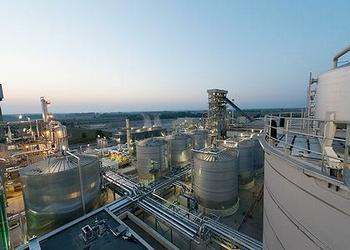
CRESCENTINO, Italy, October 14, 2013 (ENS) – The world’s first commercial-scale refinery to produce bioethanol from agricultural residues and energy crops has opened in northern Italy. When fully implemented, the system will provide 75 million liters of bioethanol annually for the European market.
Present at the opening Wednesday were Italy’s Economic Development Minister Flavio Zanonato, local and regional officials and representatives from the European Commission, as well as more than 500 stakeholders from around the world.

Situated in fields outside the city of Crescentino, the plant uses wheat straw, rice straw and arundo donax, a high-yielding energy crop grown on marginal land to produce cellulosic ethanol, using enzymes to convert the plant material into fuel.
The facility is the result of a collaboration between Beta Renewables, a cellulosic biofuels company based in Tortona, Italy, and Novozymes, the world’s largest producer of industrial enzymes, headquartered in Denmark.
The two companies formed a strategic partnership in October 2012, making Novozymes the preferred enzyme supplier for Beta Renewables’ current and future cellulosic biofuel projects.
“The advanced biofuels market presents transformational economic, environmental and social opportunities, and with the opening, we pave the way for a green revolution in the chemical sector,” said Beta Renewables Chairman and CEO Guido Ghisolfi. “We will continue to commercially expand Beta Renewables’ core technology throughout the world, and we are very confident at this stage given the demand we see around the globe.”
“The opening today presents a leap forward and is truly the beginning of a new era for advanced biofuels,” said Novozymes CEO Peder Holk Nielsen. “Here, at this plant, enabled by Novozymes’ enzymatic technology, we will turn agricultural waste into millions of liters of low-emission green fuel, proving that cellulosic ethanol is no longer a distant dream. It is here, it is happening, and it is ready for large-scale commercialization.”
Lignin, a polymer extracted from biomass during the ethanol production process, fuels an attached power plant, which generates enough power to meet the facility’s energy needs. Any excess green electricity will be sold to the local grid.
Since 2011, more than US$200 million has been invested in research and development of the technology used to produce cellulosic ethanol at the Crescentino facility with financing from the Texas Pacific Group.

Beta Renewables says its Proesa™ engineering and production technology used with Novozymes’ Cellic® enzymes represent “the most cost-competitive advanced biofuels platform in existence today.”
Proesa belongs to the so-called “second-generation” technologies which allow the use of the sugars present in lignocellulosic biomass to obtain fuel and other chemicals with lower greenhouse gas emissions and at competitive costs compared to fossil fuels such as oil and natural gas.
“Investors interested in cellulosic ethanol often ask when the technology will be ready at commercial scale,” said Ghisolfi. “PROESA enables customers to produce advanced biofuel at a cost-competitive price relative to conventional biofuels – at large-scale and today.”
“Our complete offering makes cellulosic biofuel projects bankable and replicable,” Ghisolfi said. “With the world’s first commercial plant up and running here in northern Italy, I very much look forward to an exciting journey of establishing an entirely new, and very promising, industry.”
A recent study by Bloomberg New Energy Finance concludes that transforming agricultural residues into advanced biofuels could create millions of jobs worldwide, economic growth, reduction of greenhouse gas emissions, and energy security by 2030.
But before this can occur, Ghisolfi and Nielsen say government support is necessary to accelerate the deployment of next-generation biorefineries.
“Policy makers now need to send clear signals to encourage the necessary investments in advanced biofuels,” said Nielsen. “Stable and predictable blending mandates, incentives for the collection of agricultural residues, and investment support for the first large-scale plants will help move the world substantially in terms of reducing greenhouse gases, stimulating economies, and providing energy security. Continued reliance on fossil fuels is not viable.”
Italy’s government is hearing this message. Zanonato and Environment Minister Andrea Orlando responded on the facility’s opening day with a decree that promotes the creation of new biorefineries. The decree simplifies the procedures for authorizing biorefineries, with the dual purpose of promoting them in Italy and facilitating investments in the industry.
“The use of this type of biofuel,” said Orlando, “is the solution to get to reach the target of 10 percent to 2020 European directive. The government is working to implement the plan, approved in recent months by the CIPE [the Interministerial Committee for Economic Planning], the decarbonization of the economy and the reduction of CO2 emissions, encouraging measures to promote renewable energy and energy efficiency, low-emission mobility, green chemistry and 2nd generation biofuels.”
Copyright Environment News Service (ENS) 2013. All rights reserved.
© 2013, Environment News Service. All rights reserved. Content may be quoted only with proper attribution and a direct link to the original article. Full reproduction is prohibited.
